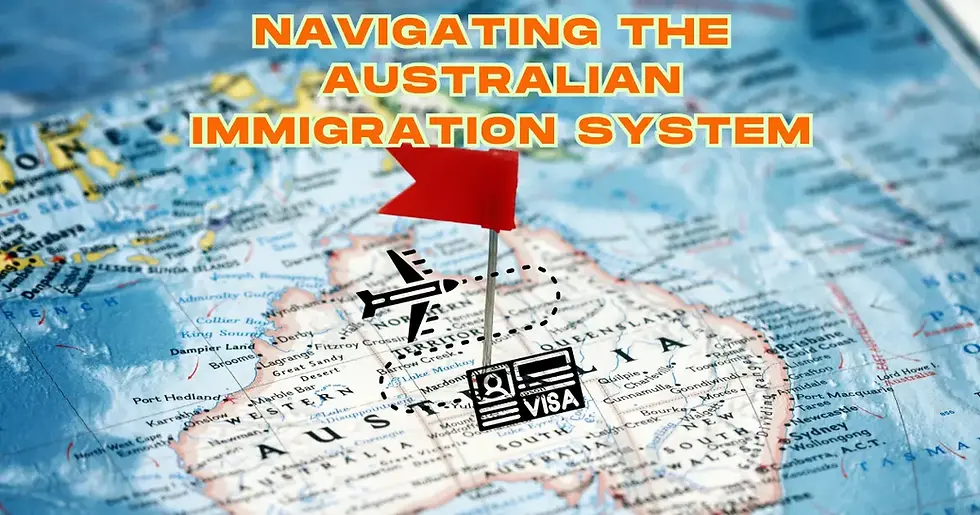NAVIGATING THE AUSTRALIAN IMMIGRATION SYSTEM: A BEGINNER'S GUIDE
- Joice M. Jose MSW, GDTAS, RMA, NZLIA

- Jun 20, 2025
- 3 min read
Updated: Jul 8, 2025
By Joice M. Jose MSW, GDTAS
Australian Registered Migration Agent (MARN: 2318264)
New Zealand Licensed Immigration Adviser since 2011 (NZLIA # 201100295)
📱 Mob/WhatsApp/BOTIM: +61 432 847 291
📧 Email: support@fortuneimmigration.com
Are you thinking of making the move to Australia? With its stunning beaches, vibrant cities, and laid-back lifestyle, it's no wonder why many people dream of calling this country home. But before you start enjoying, you’ll need to navigate the complex immigration system. Don't worry, we've got you covered! In this beginner's guide, we'll walk you through the basics of Australian immigration and provide you with some valuable tips to help you along the way.
Understanding the Australian Immigration System
The Australian immigration system can be overwhelming, but it's essential to understand how it works. The Department of Home Affairs is responsible for managing immigration, and they offer various visa options for different purposes, such as work, study, and family sponsorship.
Visa Options
There are several types of visas available, including:
1. Skilled Migration: If you have a particular skill or qualification that's in demand in Australia, you may be eligible for a skilled visa. The most common skilled visas include the Skilled Independent Visa (subclass 189) Skilled Work Regional (Provisional) Visa (subclass 491) and the Skilled Nominated Visa (subclass 190).
2. Family Sponsored Visas: If you have family members or friends who are Australian citizens or permanent residents, they may be able to sponsor you for a visa. This includes Partner visas, Child visas, and Parent visas.
3. Student Visas: If you want to study in Australia, you'll need to apply for a student visa. This will allow you to study at an Australian university or institution.
4. Working Holiday Visas: If you're looking for a working holiday in Australia, you can apply for a working holiday visa. This will allow you to work and travel in Australia for up to 12 months.
The Application Process
The application process can be lengthy and complex, but here's a general overview of what you can expect:
1. Check your eligibility: Before you apply for a visa, make sure you meet the eligibility criteria. This includes passing the points test, having a valid passport, and meeting the required English language proficiency.
2. Gather your documents: You'll need to provide various documents to support your application, such as your passport, birth certificate, and qualifications.
3. Submit your application: Once you've gathered all your documents, you can submit your application.
4. Wait for a decision: After you've submitted your application, you'll need to wait for a decision from the Department of Home Affairs. This can take several months, so be patient!
Tips for Success
Navigating the Australian immigration system can be challenging, but here are some tips to help you succeed:
1. Seek professional advice: If you're unsure about any part of the process, consider seeking advice from a registered migration agent.
2. Be thorough: Make sure you provide all the required documents and information to support your application.
3. Stay organized: Keep track of your application status and any deadlines you need to meet.
4. Be patient: The immigration process can take time, so be prepared to wait.
Navigating the Australian immigration system can be complex, but with the right information and support, you can achieve your goals. Remember to stay informed, seek professional advice when needed, and be patient throughout the process. Unlock your Australian future!!
We hope this beginner's guide has been helpful in your journey to navigate the Australian immigration system. For any professional assistance don't hesitate to reach out to the Fortune Immigration and Education.
Contact us today:
Phone/Mobile/WhatsApp/Botim: +61 432 847 291
Disclaimer: This article is valid only at the time of initial publication and is subject to change. The content does not constitute legal advice or recommendations and should not be relied upon as such. Always seek legal and professional immigration or education advice as your situation may differ from the general guidelines provided.





